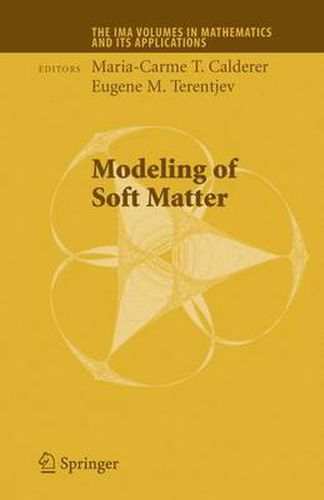Readings Newsletter
Become a Readings Member to make your shopping experience even easier.
Sign in or sign up for free!
You’re not far away from qualifying for FREE standard shipping within Australia
You’ve qualified for FREE standard shipping within Australia
The cart is loading…






This title is printed to order. This book may have been self-published. If so, we cannot guarantee the quality of the content. In the main most books will have gone through the editing process however some may not. We therefore suggest that you be aware of this before ordering this book. If in doubt check either the author or publisher’s details as we are unable to accept any returns unless they are faulty. Please contact us if you have any questions.
This IMA Volume in Mathematics and its Applications MODELING OF SOFT MATTER contains papers presented at a very successful workshop with the same ti tle. The event, which was held on September 27-October 1, 2004, was an integral part of the 2004-2005 IMA Thematic Year on Mathematics of Ma terials and Macromolecules: Multiple Scales, Disorder, and Singularities.
We would like to thank Maria-Carme T. Calderer (School of Mathematics, University of Minnesota) and Eugene M. Terentjev (Cavendish Laboratory, University of Cambridge) for their superb role as workshop organizers and editors of the proceedings. We take this opportunity to thank the National Science Foundation for its support of the IMA. Series Editors Douglas N. Arnold, Director of the IMA Arnd Scheel, Deputy Director of the IMA PREFACE The physics of soft matter in particular, focusing on such materials as complex fluids, liquid crystals, elastomers, soft ferroelectrics, foams, gels and particulate systems is an area of intense interest and contemporary study. Soft matter plays a role in a wide variety of important processes and application, as well as in living systems. For example, gel swelling is an essential part of many biological processes such as motility mecha nisms in bacteria and the transport and absorption of drugs. Ferroelectrics, liquid crystals, and elastomers are being used to design ever faster switch ing devices. Experiments of the last decade have provided a great deal of detailed information on structures and properties of soft matter.
$9.00 standard shipping within Australia
FREE standard shipping within Australia for orders over $100.00
Express & International shipping calculated at checkout
This title is printed to order. This book may have been self-published. If so, we cannot guarantee the quality of the content. In the main most books will have gone through the editing process however some may not. We therefore suggest that you be aware of this before ordering this book. If in doubt check either the author or publisher’s details as we are unable to accept any returns unless they are faulty. Please contact us if you have any questions.
This IMA Volume in Mathematics and its Applications MODELING OF SOFT MATTER contains papers presented at a very successful workshop with the same ti tle. The event, which was held on September 27-October 1, 2004, was an integral part of the 2004-2005 IMA Thematic Year on Mathematics of Ma terials and Macromolecules: Multiple Scales, Disorder, and Singularities.
We would like to thank Maria-Carme T. Calderer (School of Mathematics, University of Minnesota) and Eugene M. Terentjev (Cavendish Laboratory, University of Cambridge) for their superb role as workshop organizers and editors of the proceedings. We take this opportunity to thank the National Science Foundation for its support of the IMA. Series Editors Douglas N. Arnold, Director of the IMA Arnd Scheel, Deputy Director of the IMA PREFACE The physics of soft matter in particular, focusing on such materials as complex fluids, liquid crystals, elastomers, soft ferroelectrics, foams, gels and particulate systems is an area of intense interest and contemporary study. Soft matter plays a role in a wide variety of important processes and application, as well as in living systems. For example, gel swelling is an essential part of many biological processes such as motility mecha nisms in bacteria and the transport and absorption of drugs. Ferroelectrics, liquid crystals, and elastomers are being used to design ever faster switch ing devices. Experiments of the last decade have provided a great deal of detailed information on structures and properties of soft matter.